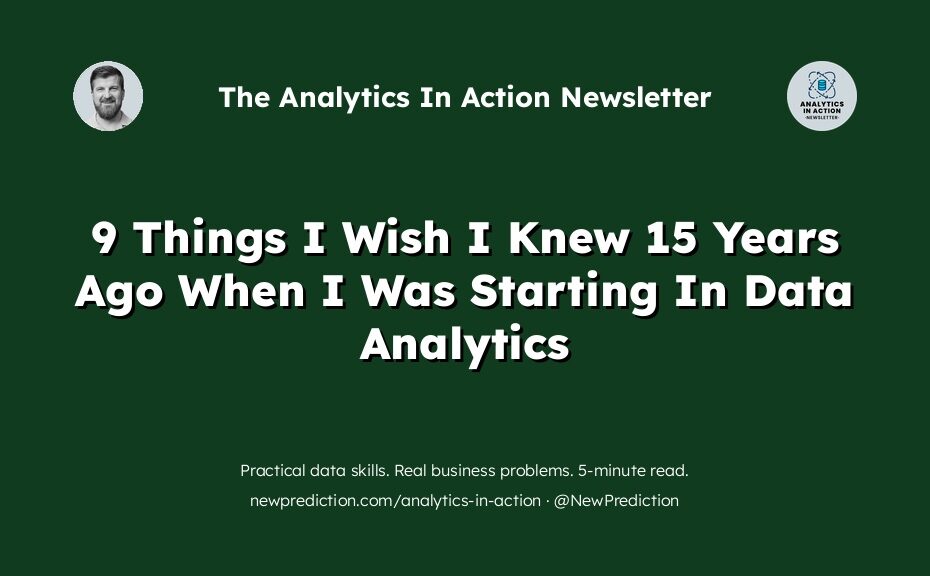Today, I’m sharing 9 things I wish I knew when I was just getting started in data analytics 15 years ago.
I’ve been working with data for the past 15+ years.
Unfortunately, there were times that I doubted the path I was on:
- SQL joins were confusing
- I didn’t get Python best practices
- Excel pivot tables were hard to understand
- Communicating with business partners and clients
Fortunately, I figured out things along the way and never looked back.
It’s easy to get tripped up if you don’t know what to watch out for.
You will waste a lot of time and energy:
- Second-guessing the path you’re on
- Believing you only have one shot
- Not realizing your full potential
- Getting mad and quitting
Fortunately, if you know what to look for, you can avoid all the hassle on your data analytics journey.
Here are the 9 things I wish I know 15 years ago:
1. Being a data analyst is like having a superpower
Your confidence increases as you solve more and more problems using data. Eventually, you become the “go-to” person for this stuff.
- Working with data and SQL
- Answering questions they never even thought to ask with Tableau
- Creating simple (to you) but magic (to them) Excel docs
- Automating tedious work with Python
2. Every industry needs data analysts
I like working in the financial services industry, especially with sales and marketing data. However: Every. Single. Company. has data and needs help.
Just have a look:
- Medical industry entry-level job in Massachusetts starting at $78k
- Entertainment business data analyst starting at $65k per year
- Higher education entry-level data analyst starting at $60k per year
- Digital business analyst at Nike (no salary estimate)
3. You don’t have to become a data scientist
Until recently, I assumed the career progression ended with becoming a data scientist. Since then, I’ve found a better path, getting into product management in strategic data analytics.
Other career paths as you advance in data analytics:
- Tech lead
- Team manager
- Project manager
- Senior data analyst
- Software engineering
- Data strategy and governance
- Product management (my path)
4. It’s okay if it takes a while for things to click
Some of the skills you need as a data analyst are hard to learn! And that’s okay. For example, I remember SQL JOINs taking forever and then “clicking” one day.
Everyone learns at their own pace. Don’t bother comparing yourself to others. Just focus on taking one step at a time.
One tip: share what you are learning and what you are struggling with. Chances are that there is someone that can help you and someone that can learn from you.
5. Soft skills > technical skills
While it’s true that technical skills (like SQL, Tableau, Excel, and Python) are absolutely required, you’ll need to develop soft skills to grow in your career.
- Communication
- Collaboration
- Problem-solving
- Critical thinking
The best analysts take their 2-3 tech skills and layer on the soft skills. If you can do that, you are unstoppable!
6. You don’t need to know everything about data
I remember thinking I had to memorize long SQL formulas and know all of the normalization forms by heart. Nope. You can pick those things up when needed.
I compiled a list of cheat sheets/websites on Twitter:
7. Solving real business problems with data is fun!
Seeing an “aha moment” in your boss’s face or a client’s face when you share an insight from the data that they had no idea about is a magical feeling.
Getting good at data analytics (to the point where you can take a brand new data set, play around for a while, and then derive some insights) just never gets old!
8. Your portfolio is the ultimate cheat code for interviews
Think about your last interview. How prepared did you feel? Chances are you prepared a lot, but still felt nervous.
Having an online data analytics portfolio takes that anxiety away:
- The interview has already seen your work
- You have ready examples of your best projects
- You are able to speak to each project with confidence.
Never go into another interview without a rock-solid data analytics portfolio.
9. Writing well is the icing on the cake
Being able to write well is a MUST HAVE skill for data analysts these days:
- Writing clearly and concisely
- Project writeups for your boss or clients
- Code and project documentation
- Slack messages, emails, and more
By writing well, you will stand out from the crowd. The #1 thing I did this year is to enroll in Ship 30 for 30 (sign up today and save $100 for the final cohort for 2022 starting this month)
Next Steps
- Pre-order my new book: How To Build An Awesome Online Data Analytics Portfolio in 14 Days (Preorder Special: 50% off until Oct 5th)
- Improve your soft skills by learning to write well

Pingback: Struggling with a Career Pivot? Use these 3 SQL Interview Questions as the Bridge to Business Analytics Mastery (Full Code Inside) - New Prediction
Pingback: The Step-by-Step Guide to Automating Call Center Reports Using Excel and Python (Code Included) - New Prediction
Pingback: From Data to Decisions: The Step-By-Step Introduction to Crafting Executive Dashboards with Python & Plotly Dash (Code Included) – New Prediction